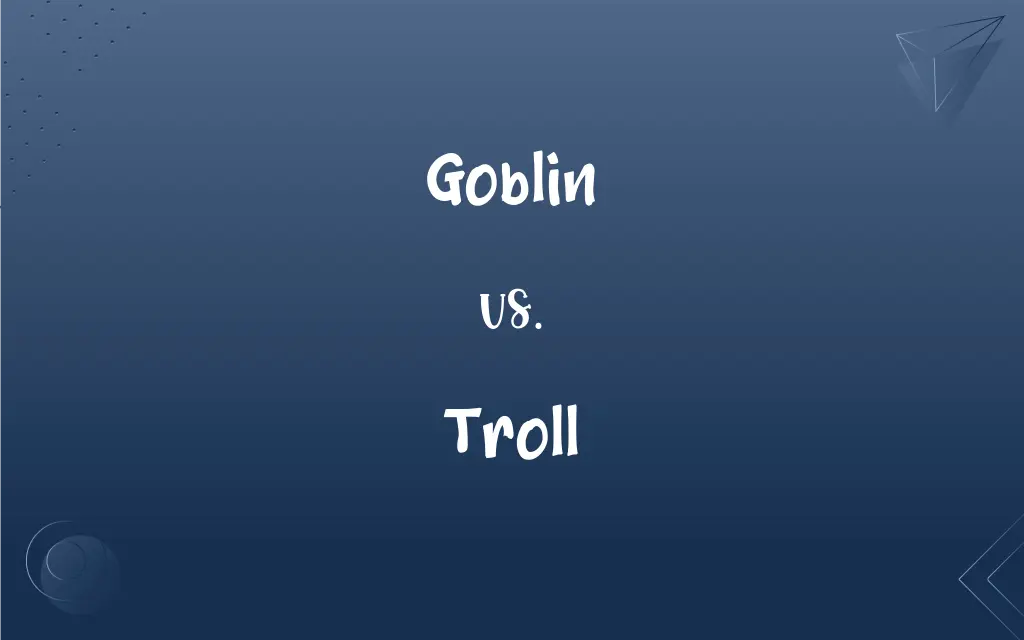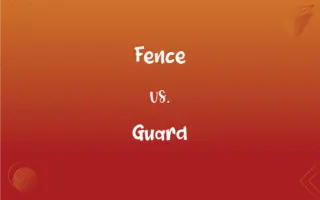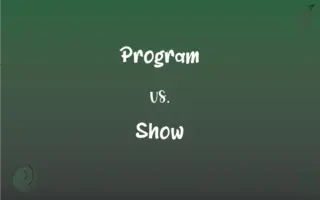Goblin vs. Troll: What's the Difference?
Edited by Aimie Carlson || By Janet White || Updated on June 12, 2024
Goblins are often depicted as small, mischievous creatures, while trolls are typically portrayed as larger, brutish beings. Both are staples of folklore and fantasy.

Key Differences
Goblins are commonly portrayed in folklore and fantasy fiction as small, cunning creatures. They are often troublemakers with a mischievous nature, sometimes inclined towards malevolence. Trolls, on the other hand, are generally depicted as much larger creatures. They are often characterized by a certain brutishness or lack of intellect, with a propensity for dwelling in isolated regions like mountains or caves.
Goblins, in many stories and settings, are depicted as weaker beings, often using trickery and numbers to achieve their goals. They are synonymous with greed, especially for gold and shiny objects. Trolls are usually depicted with immense physical strength, sometimes endowed with regenerative abilities, making them formidable opponents in tales of conflict and conquest.
In various cultures, Goblins often have roles that lean more towards being a nuisance rather than a serious threat, engaging in activities like stealing or playing annoying tricks. Conversely, Trolls can be outright dangerous in folklore, often described as eating humans or spreading havoc, positioned as antagonists in many myths and stories.
The physical appearance of Goblins and Trolls also differs significantly. Goblins are often described as humanoid figures of small stature, with sharp features and an unsettling smile. Trolls, however, are frequently portrayed as gigantic and monstrous, with coarse features, symbolizing their connection with primal and destructive forces.
In modern media, Goblins and Trolls have found their way into various genres. Goblins are often the sly, secondary adversaries or uneasy allies in many fantasy narratives. Trolls may serve as major physical threats, often embodying the brute force that heroes must overcome, maintaining their status in the hierarchy of mythical creatures.
ADVERTISEMENT
Comparison Chart
Etymology
Derived from the German "kobold" or the Old French "gobelin," suggesting a connection to mischief
Originates from Old Norse "troll" meaning giant or demon, indicative of their fearsome nature
Plural Form
Goblins
Trolls
Usage in literature
Often used to describe a variety of small, cunning, fairy-like creatures
Typically refers to larger, monstrous beings, often lacking intelligence
Grammatical role
Commonly a noun, "goblin" can denote one or a species of creatures
Used predominantly as a noun, "troll" can signify an individual entity or an entire species
Adjective form
Goblin-like (resembling a goblin)
Troll-like (resembling a troll)
ADVERTISEMENT
Goblin and Troll Definitions
Goblin
Goblins are mythical, small, humanoid creatures known for their mischievous behavior.
The goblin stealthily crept into the houses, causing mischief wherever it went.
Troll
In folklore, trolls are known for their hostility toward humans, often portrayed as dangerous and antagonistic.
The villagers feared the troll living in the nearby forest due to its reputation for causing destruction.
Goblin
In folklore, goblins are often troublemakers, sometimes with a malicious streak, known for tricking and frustrating humans.
She was careful not to offend the goblins, as they were known to retaliate with nasty pranks.
Troll
Trolls are characterized by their notable physical features, including their immense size and rough, stone-like skin.
The troll's skin was as rough as the rocky mountain terrain it inhabited.
Goblin
Goblins are characterized by their greed, often hoarding treasures and shiny objects.
The adventurers entered the cave, aiming to reclaim the gold the goblins had pilfered.
Troll
In various narratives, trolls possess regenerative abilities, recovering quickly from wounds or turning to stone in sunlight.
The warriors found it difficult to defeat the troll, as its wounds would heal almost immediately.
Goblin
Goblins are commonly depicted as intelligent and cunning, using their wits to survive in a world of larger, stronger creatures.
The goblin crafted a clever trap for the unsuspecting travelers.
Troll
To fish for by trailing a baited line from behind a slowly moving boat.
Goblin
In contemporary culture, goblins can be portrayed either as malevolent monsters or as mischievous, yet benign beings.
In the film, the goblin, a sympathetic character, embarks on a quest to save its human friend.
Troll
To fish in by trailing a baited line
Troll the lake for bass.
Goblin
A grotesque elfin creature of folklore, thought to work mischief or evil.
Troll
To trail (a baited line) in fishing.
Goblin
One of various hostile supernatural creatures, now especially (fantasy literature) a malevolent and grotesque diminutive humanoid, often associated with orcs or trolls.
Troll
To move around in (an area) or go to (different places) searching for something
"The players cautiously refrain from saying anything candid to the press trolling the clubhouse" (David Grann).
Goblin
An evil or mischievous spirit; a playful or malicious elf; a frightful phantom; a gnome.
To whom the goblin, full of wrath, replied.
Troll
To examine or search through
Trolling the classifieds for a cheap car.
Goblin
(folklore) a small grotesque supernatural creature that makes trouble for human beings
Troll
To sing in succession the parts of (a round, for example).
Troll
To sing heartily
Troll a carol.
Troll
To post inflammatory or irrelevant material on (an electronic forum) to provoke responses.
Troll
To fish by trailing a line, as from a moving boat.
Troll
To stroll along or wander
"As he was extremely early, he trolled past the community center" (David Bezmozgis).
Troll
To move around in an area or go to different places searching for something.
Troll
To examine or search through something
Trolling through old family photos looking for a picture of my aunt.
Troll
(Music) To sing heartily or gaily.
Troll
The act of trolling for fish.
Troll
A lure, such as a spoon or spinner, that is used for trolling.
Troll
(Music) A vocal composition in successive parts; a round.
Troll
A person who posts inflammatory or otherwise unwanted material on an electronic forum, especially anonymously.
Troll
The material so posted.
Troll
A supernatural creature of Scandinavian folklore, variously portrayed as a friendly or mischievous dwarf or as a giant, that lives in caves, in the hills, or under bridges.
Troll
(Derogatory) A person, especially an older gay man, considered to be unpleasant or ugly.
Troll
(fantasy) A supernatural being of varying size, now especially a grotesque humanoid creature living in caves or hills or under bridges.
Troll
(slang) An ugly person of either sex, especially one seeking sexual experiences.
Troll
Optical ejections from the top of the electrically active core regions of thunderstorms that are red in color that seem to occur after tendrils of vigorous sprites extend downward toward the cloud tops.
Troll
An instance of trolling, especially, in fishing, the trailing of a baited line.
Troll
A person who posts or says inflammatory, insincere, digressive, extraneous, or off-topic messages to provoke others on the Internet for their own personal amusement or to manipulate others' perception.
Keyboard warrior
Troll
The act of moving round; routine; repetition.
Troll
A song whose parts are sung in succession; a catch; a round.
Troll
(obsolete) A trolley.
Troll
(intransitive) To saunter.
Troll
(intransitive) To trundle, to roll from side to side.
Troll
To draw someone or something out, to entice, to lure as if with trailing bait.
Troll
To fish using a line and bait or lures trailed behind a boat similarly to trawling; to lure fish with bait.
Troll
(transitive) To angle for with a trolling line, or with a hook drawn along the surface of the water; hence, to allure.
Troll
(transitive) To fish in; to try to catch fish from.
Troll
To stroll about in order to find a sexual partner.
He spends most of his waking hours trolling on WIRE.
Troll
To post or make inflammatory or insincere statements so as to attempt to lure others into combative argument for purposes of personal entertainment or to manipulate others' perception, especially in an online community or discussion.
Troll
To move circularly; to roll; to turn.
Troll
To send about; to circulate, as a vessel in drinking.
Troll
To sing the parts of in succession, as of a round, a catch, and the like; also, to sing loudly, freely or in a carefree way.
Troll
A supernatural being, often represented as of diminutive size, but sometimes as a giant, and fabled to inhabit caves, hills, and like places; a witch.
Troll
The act of moving round; routine; repetition.
Troll
A song the parts of which are sung in succession; a catch; a round.
Thence the catch and troll, while "Laughter, holding both his sides," sheds tears to song and ballad pathetic on the woes of married life.
Troll
A trolley.
Troll
To move circularly or volubly; to roll; to turn.
To dress and troll the tongue, and roll the eye.
Troll
To send about; to circulate, as a vessel in drinking.
Then doth she troll to the bowl.
Troll the brown bowl.
Troll
To sing the parts of in succession, as of a round, a catch, and the like; also, to sing loudly or freely.
Will you troll the catch ?
His sonnets charmed the attentive crowd,By wide-mouthed mortaltrolled aloud.
Troll
To angle for with a trolling line, or with a book drawn along the surface of the water; hence, to allure.
Troll
To fish in; to seek to catch fish from.
With patient angle trolls the finny deep.
Troll
To roll; to run about; to move around; as, to troll in a coach and six.
Troll
To move rapidly; to wag.
Troll
To take part in trolling a song.
Troll
To fish with a rod whose line runs on a reel; also, to fish by drawing the hook through the water.
Their young men . . . trolled along the brooks that abounded in fish.
Troll
(Scandanavian folklore) a supernatural creature (either a dwarf or a giant) that is supposed to live in caves or in the mountains
Troll
A partsong in which voices follow each other; one voice starts and others join in one after another until all are singing different parts of the song at the same time;
They enjoyed singing rounds
Troll
A fisherman's lure that is used in trolling;
He used a spinner as his troll
Troll
Angling by drawing a baited line through the water
Troll
Circulate, move around
Troll
Cause to move round and round;
The child trolled her hoop
Troll
Sing the parts of (a round) in succession
Troll
Angle with a hook and line drawn through the water
Troll
Sing loudly and without inhibition
Troll
Praise or celebrate in song;
All tongues shall troll you
Troll
Speak or recite rapidly or in a rolling voice
Troll
Trolls are mythical beings often depicted as large, slow-witted, and strong, usually living in caves or beneath bridges.
The troll blocked the bridge, demanding a toll from anyone who wished to cross.
Troll
In modern usage, "troll" can also refer to someone who instigates conflict on the internet by posting inflammatory content.
He decided to ignore the troll's provocative comments on his post.
FAQs
Can goblins and trolls use magic?
Folklore varies; goblins are occasionally depicted with magical abilities, while trolls rarely are.
Are goblins and trolls considered the same creature?
No, goblins are generally small and mischievous, while trolls are larger and more brutish.
Do goblins and trolls have a common origin?
No, their mythological origins are separate, with goblins from European folklore and trolls from Norse mythology.
Are goblins smarter than trolls?
Generally, yes. Goblins are often shown as cunning, whereas trolls are depicted as less intelligent.
Are goblins and trolls immortal?
Typically, no. They have lifespans and vulnerabilities, though these vary across stories.
What's the typical habitat for goblins and trolls?
Goblins are often depicted living in forests, caves, or human societies, while trolls prefer isolated, natural habitats.
Can goblins and trolls coexist in stories?
Yes, in fantasy literature and media, they can be part of the same narrative but maintain distinct characteristics.
Are goblins only malevolent?
No, they can be neutral or even benevolent, though they are often portrayed as mischievous.
Do trolls eat humans?
In many myths, yes, trolls are known to be man-eaters.
How do you defeat a troll?
Methods vary; in some tales, sunlight turns them to stone, while in others, they're outwitted or physically overcome.
Are there female goblins and trolls?
Yes, female goblins and trolls exist in various folklore and fantasy stories.
Are goblins considered fairies?
They are sometimes categorized as a type of fairy due to their magical and mischievous nature.
Are trolls always evil?
No, modern interpretations especially have depicted nuanced trolls, some even being kind.
Can goblins and trolls speak?
In most stories, yes, they can, often in human languages.
How do goblins and trolls typically interact with humans?
Goblins often trick or annoy humans, while trolls are more likely to threaten or attack them.
Can goblins be friendly to humans?
Yes, some stories depict goblins as friendly or neutral toward humans, though this is less common.
What's the best-known cultural depiction of goblins and trolls?
Both creatures are prominent in European folklore, but their popularity surged globally due to fantasy literature like "The Hobbit" and "Harry Potter."
Do goblins serve a greater evil power?
Sometimes in fantasy settings, goblins are minions to a darker, more powerful entity.
How big can a troll get?
In folklore and fantasy, trolls can range from human-sized to gigantic.
Are there modern interpretations of goblins and trolls?
Yes, both creatures have been adapted into modern media, often with more depth and varied personalities.
About Author
Written by
Janet WhiteJanet White has been an esteemed writer and blogger for Difference Wiki. Holding a Master's degree in Science and Medical Journalism from the prestigious Boston University, she has consistently demonstrated her expertise and passion for her field. When she's not immersed in her work, Janet relishes her time exercising, delving into a good book, and cherishing moments with friends and family.
Edited by
Aimie CarlsonAimie Carlson, holding a master's degree in English literature, is a fervent English language enthusiast. She lends her writing talents to Difference Wiki, a prominent website that specializes in comparisons, offering readers insightful analyses that both captivate and inform.































































